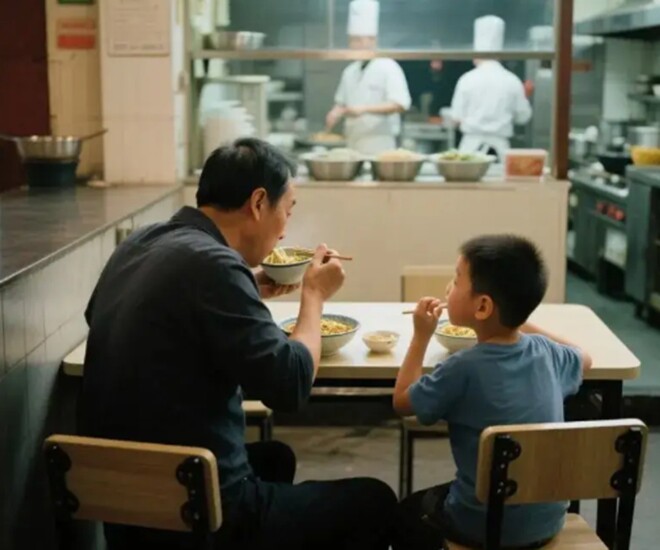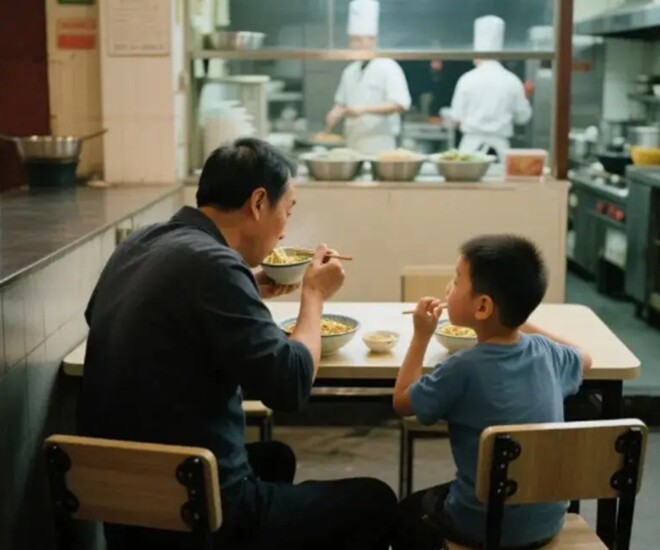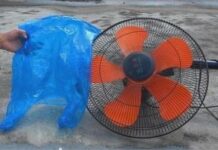In a small, quiet noodle shop in the alleys of Guangzhou, China, a father and son duo walked in.
The father wore a faded brown outfit, while the son donned a simple yet new and crisp short-sleeved shirt and pants.
The pair sat down at a table. The man called the waiter and ordered one bowl of noodles. The waiter questioned why they only ordered one bowl when there were two of them, and the child was clearly old enough to eat on his own.
The father scratched his head, indicating that they didn’t have enough money for two bowls.

The son quickly took the bowl of noodles and started eating, paying no attention to his father.
The shop owner, who had been observing from inside, signaled to the waiter to prepare another bowl of noodles for the father. Although embarrassed, the father thanked the kind waiter and owner.
However, what shocked everyone was that after the son finished his bowl, he took his father’s bowl, picked out the good bits, and dumped most of the noodles into his own bowl.
As a result, the father was left with only a little broth and a few strands of noodles. He said nothing and quietly finished what was left.
When it was time to pay, the son kept urging: “Hurry up, Dad! What’s taking so long?”
Check out this video: 3 signs of a respectful child
As the father hurriedly paid, he accidentally dropped a few coins on the ground. He bent down to pick them up. The son, standing at the door, turned away with a frown on his face.
The shop owner, watching from inside the counter, shook his head and sighed. He whispered to the waiter: “You see, this father won’t even get to live in a retirement home later on.”
Overindulgence only breeds ungrateful children
Many parents dedicate their lives to their children, thinking that keeping them happy is a blessing.
But they don’t realize that by giving unlimitedly, they are raising ungrateful children who will turn their backs on their parents in old age.
“Discipline between father and son should not be taken lightly, for leniency will spoil a child.”
It is said that raising a son is a preparation for old age, but if the son only knows how to take and not how to give back, the parents’ golden years will be filled with sorrow.
As the old saying goes, “There is no spoiled child who is not arrogant, and no arrogant child who does not fail.”
Parents’ dedication is often repaid with their children taking it for granted.
If you shield your child from every rain, they will never learn to hold an umbrella themselves.
When a child gets used to demanding everything, they will consider their parents’ blood, sweat, and tears as their birthright.
Such children only have space for themselves and cannot feel gratitude.

Illustration
“If you love your child, teach them the right path and steer them away from wrongdoing”
If you love your child, you must teach them moral principles and stop them from going astray.
You may think you’re giving your child the best, but in reality, you’re hindering their growth.
Giving children whatever they want and not correcting their mistakes is not love; it is harmful.
When parents grow old and need support, these children are often the first to run away and have the hardest hearts.
Having gotten used to taking, they don’t feel guilty about their parents’ sacrifices and take them for granted.
Effective education requires parental firmness
As the saying goes, “A loving mother spoils her child.”
A mother who is too soft-hearted often raises a “wild” child. So, when educating children, we must sometimes be tough.
“Toughness” here doesn’t mean beating, scolding, or abusing, but rather setting rules and allowing children to experience pain, failure, and responsibility.
When they fall, don’t rush to pick them up; let them stand on their own. When they make mistakes, don’t easily forgive them; let them face the consequences.
Without this toughness, no matter how many truths you speak, they will fall on deaf ears, and no matter how favorable the conditions, you won’t be able to raise a self-reliant and successful individual.
The essence of education is to help children survive independently in the world, and “toughness” is a necessary component of that education.
If you don’t want your child to experience pain, they will never learn to be strong. If you don’t want them to face the consequences of their actions, they will never develop a sense of responsibility.
Every responsibility you shield them from today will become a burden that crushes them tomorrow.

Illustration
Letting children take responsibility and go through difficulties is not cruel; it is the wisest foresight.
This is the capital that helps them find their place in society and also the bargaining chip to gain respect from others.
Every time you “grit your teeth” and let them face challenges, you are laying the foundation for their future.
Teaching them self-reliance will be your strongest support in old age.
An educator once said: “Everything we do for children will bear fruit, not only affecting their lives but also determining their future.”
True love is not shielding them from life’s storms but teaching them to stand firm in the face of adversity.
Only when discipline, warmth in education, and punishment are combined can we pave the way for children’s independence and responsibility.
1. Willing to manage: Set rules for your child
Professor Li Meijin, an educator, once said: “Children need self-discipline and adherence to rules to grow up. Rules are the first levee in their lives.”
The biggest mistake parents make is using freedom as an excuse to indulge themselves and their children.
Few realize that a childhood without boundaries leads to an adulthood of chaos.
If you don’t care about your child running a red light, society will punish them in the future. If you don’t teach them not to hit others, the law will discipline them in your place.
Rules are not chains but boundaries that help children see the world more clearly.
Psychological research has confirmed that children in families with clear rules feel 37% safer.
When children know what they cannot do, they can focus on what they can.
If you instill rules in your child’s heart today, they will find their place in society tomorrow.

Illustration
2. Willing to teach: Lead by example, not just words
“Every moment you see a child, you also see yourself.”
Lecturing is the least effective form of education, while demonstration is the most powerful language.
Children won’t always listen to what you say, but they will always watch what you do.
Parents who stay up late watching movies shouldn’t expect their children to love reading. Parents who scold and curse won’t raise well-behaved children.
The nature of education is a silent “live broadcast”:
If you spit everywhere, your child will learn to disregard public morals. If you treat your neighbors well, your child will learn to respect boundaries.
Children’s rebellion doesn’t happen suddenly; it’s a silent protest against daily hypocritical moral preaching.
3. Willing to discipline: Teach children that their actions have consequences
A psychologist once said: “Children need not only love but also restraint and authority.”
Overprotection leads to a lack of responsibility and courage to face the consequences of their actions.
Discipline is not the goal but to make children aware of the clear cause-and-effect relationship between behavior and outcomes.
If something is broken, it must be fixed. If someone is hurt, an apology is due. If studies are neglected, the pressure of falling behind must be faced.
When children learn to face the consequences of their choices, a sense of responsibility will take root in their hearts.
The ultimate goal of education is to raise individuals who are independent and capable of taking responsibility for their lives.
“Crawling Before Walking: A Parent’s Guide to Their Child’s Early Development”
“The early development of children who either crawl before walking or walk before crawling has long been a topic of interest, with many wondering if there are discernible differences in their growth. As these children mature, three distinct variations in their physical, cognitive, and social abilities become apparent.”
“What’s Our Net Worth, Mom?” 4 Answers That Shape 4 Different Destinies.
“Regardless of one’s financial background, it is imperative to instill in children an awareness of their financial reality, along with prudent spending habits and effective money management skills. Empowering them with this knowledge from a young age will undoubtedly set them on a path toward a secure and prosperous future.”








































